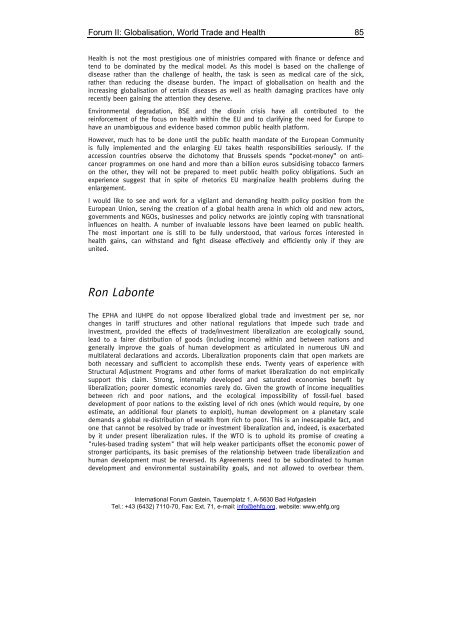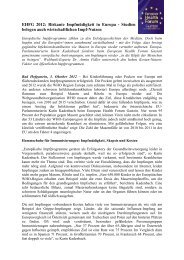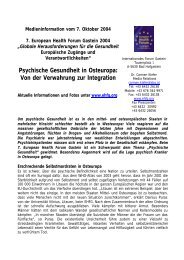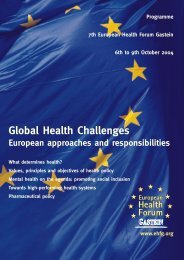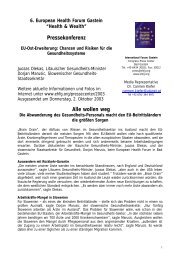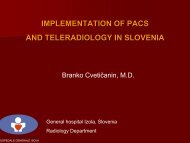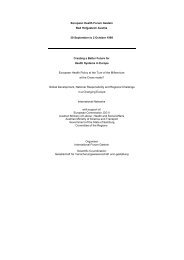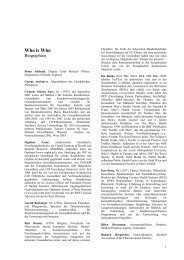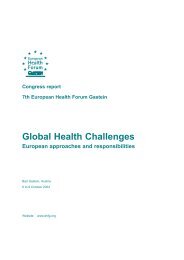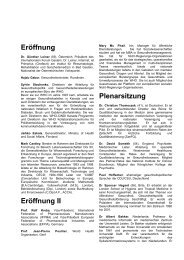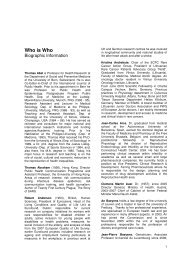Congress report - European Health Forum Gastein
Congress report - European Health Forum Gastein
Congress report - European Health Forum Gastein
Create successful ePaper yourself
Turn your PDF publications into a flip-book with our unique Google optimized e-Paper software.
<strong>Forum</strong> II: Globalisation, World Trade and <strong>Health</strong><br />
<strong>Health</strong> is not the most prestigious one of ministries compared with finance or defence and<br />
tend to be dominated by the medical model. As this model is based on the challenge of<br />
disease rather than the challenge of health, the task is seen as medical care of the sick,<br />
rather than reducing the disease burden. The impact of globalisation on health and the<br />
increasing globalisation of certain diseases as well as health damaging practices have only<br />
recently been gaining the attention they deserve.<br />
Environmental degradation, BSE and the dioxin crisis have all contributed to the<br />
reinforcement of the focus on health within the EU and to clarifying the need for Europe to<br />
have an unambiguous and evidence based common public health platform.<br />
However, much has to be done until the public health mandate of the <strong>European</strong> Community<br />
is fully implemented and the enlarging EU takes health responsibilities seriously. If the<br />
accession countries observe the dichotomy that Brussels spends “pocket-money” on anticancer<br />
programmes on one hand and more than a billion euros subsidising tobacco farmers<br />
on the other, they will not be prepared to meet public health policy obligations. Such an<br />
experience suggest that in spite of rhetorics EU marginalize health problems during the<br />
enlargement.<br />
I would like to see and work for a vigilant and demanding health policy position from the<br />
<strong>European</strong> Union, serving the creation of a global health arena in which old and new actors,<br />
governments and NGOs, businesses and policy networks are jointly coping with transnational<br />
influences on health. A number of invaluable lessons have been learned on public health.<br />
The most important one is still to be fully understood, that various forces interested in<br />
health gains, can withstand and fight disease effectively and efficiently only if they are<br />
united.<br />
Ron Labonte<br />
The EPHA and IUHPE do not oppose liberalized global trade and investment per se, nor<br />
changes in tariff structures and other national regulations that impede such trade and<br />
investment, provided the effects of trade/investment liberalization are ecologically sound,<br />
lead to a fairer distribution of goods (including income) within and between nations and<br />
generally improve the goals of human development as articulated in numerous UN and<br />
multilateral declarations and accords. Liberalization proponents claim that open markets are<br />
both necessary and sufficient to accomplish these ends. Twenty years of experience with<br />
Structural Adjustment Programs and other forms of market liberalization do not empirically<br />
support this claim. Strong, internally developed and saturated economies benefit by<br />
liberalization; poorer domestic economies rarely do. Given the growth of income inequalities<br />
between rich and poor nations, and the ecological impossibility of fossil-fuel based<br />
development of poor nations to the existing level of rich ones (which would require, by one<br />
estimate, an additional four planets to exploit), human development on a planetary scale<br />
demands a global re-distribution of wealth from rich to poor. This is an inescapable fact, and<br />
one that cannot be resolved by trade or investment liberalization and, indeed, is exacerbated<br />
by it under present liberalization rules. If the WTO is to uphold its promise of creating a<br />
"rules-based trading system" that will help weaker participants offset the economic power of<br />
stronger participants, its basic premises of the relationship between trade liberalization and<br />
human development must be reversed. Its Agreements need to be subordinated to human<br />
development and environmental sustainability goals, and not allowed to overbear them.<br />
International <strong>Forum</strong> <strong>Gastein</strong>, Tauernplatz 1, A-5630 Bad Hofgastein<br />
Tel.: +43 (6432) 7110-70, Fax: Ext. 71, e-mail: info@ehfg.org, website: www.ehfg.org<br />
85


